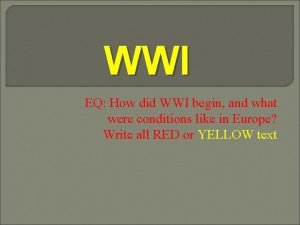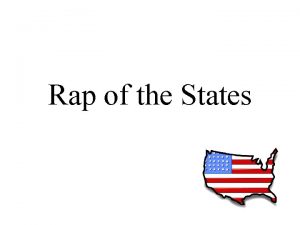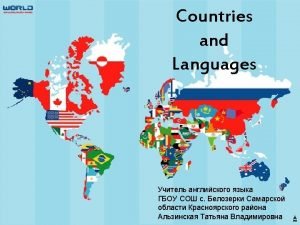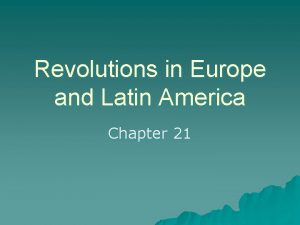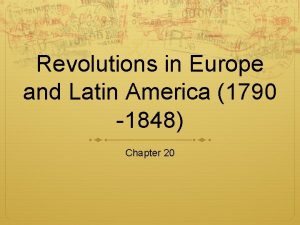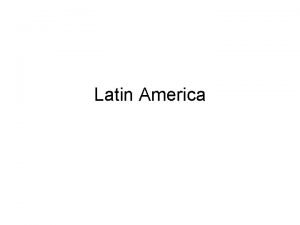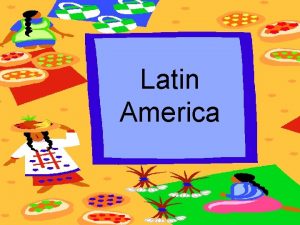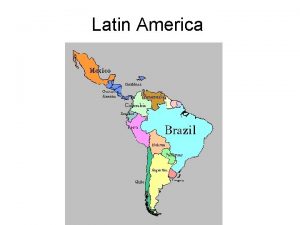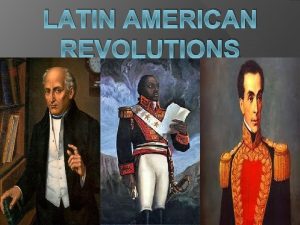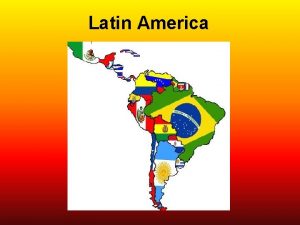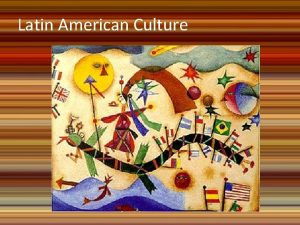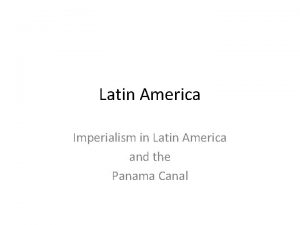Latin America and WWI Latin America and WWI










- Slides: 10

Latin America and WWI

Latin America and WWI The leaders of the Latin American nations had met four times prior to the outbreak of the war, but at no time did they consider the need or advantage of collaboration to preserve their neutrality in the event of a foreign war – this left them without a plan at the outbreak of WWI. The Latin Americans saw the conflict as none of their business and perceived little threat – in part this was due to US President Wilson’s late recognition of the dangers to the Americas and his lack of foresight in recommending a collaborative defense agreement. 1914: US and Latin America hoped to stay out of war and leave Canada as the only American nation involved Despite neutrality, trade was still disrupted and economic losses incurred

Accusations of neutrality violations occurred frequently: - Britain and France claimed Colombia, Ecuador, Peru and Chile were helping the Germans by allowing them to sail in their territory and trade for coal - There were unfounded rumors that the Germans had a naval base at Easter Island (Chile) and the Galapagos Islands (Ecuador) that they were using to attack British ships - Frequent German U-boat attacks on neutral Latin American ships (would lead nations into the war, put pressure on others to enter, and when it pushed the US to finally enter the war it inspired 10 other countries to either declare war or sever diplomatic relations)

The four major countries in Latin America were: Mexico, Argentina, Chile and Brazil Mexico - Officially neutral, though there was widespread suspicion of German support - Many believed German money was backing Carranza (Zimmerman note seemed to support this), several large Mexican newspapers were subsidized by Germany and many Mexicans sympathized with German government - This did not sit well with US, whose political pressure put Carranza in office- especially since he needed US support - He was not as much pro-German, as he was anti-US imperialism and anti-Yanqui intervention.

Argentina - President Hipolito Yrigoyen saw no reason for his country to do anything but profit from the sale of war materials (wasn’t concerned about neutrality rights) - When German began sinking Argentine ships, there were mass anti-German protests and riots in Buenos Aires – Irigoyen was very unpopular - Didn’t sever ties with Germany when US entered the war and didn’t speak out against Germany for fear of losing trade opportunities (even though the Argentine Congress voted 7619 to end German relations) - Argentina emerged from war as a creditor nation for the first time in its history (sold surplus wheat and beef to Britain and France and made a ton of money)

Chile - Chile’s neutrality was not as unpopular as Argentina’s - Chilean leaders viewed neutrality as an essential step toward creating truly independent South American nations capable of standing up to the US - Reflected anti-US and pro-German sentiment of Chilean pop. , but it backfired when Peru and Bolivia both supported US and left Chile isolated and trying to gain support from US - War brought huge demand for Chilean nitrates and copper, but when war ended unemployment rose and communist party became more popular (Chilean President Juan Luis Sanfuentes would face opposition from communist leader, Luis Recabarren)

Brazil - Brazil was the only large South American nation to declare war on Germany - they entered after numerous Brazilian ships were sunk by Germany U-boats - Brazil’s greatest contribution to the war effort was food (beef, beans and sugar) and the seizure of German ships – this enhanced Brazil’s status in world affairs and heightened the sense of nationalism in a previously disjointed country The Central American and Caribbean nations (and smaller South American countries) were officially pro-ally. Those that followed the US lead and declared war on Germany included: * Cuba * Panama * Haiti * Honduras * Costa Rica * Dom Rep * El Salvador * Bolivia * Peru * Uruguay * Colombia

Consequences of WWI The following things occurred in Latin America due to World War I: * Growth of US economic dominance in the region * Beginning of mass political movements * Spread of Latin American nationalism All American nations were faced acute financial and commercial disturbance as a result of the war. This served as a harsh reminder to Latin America of their vulnerable position within a European-dominated world.

• Trade with the US increased during the war – increased flow of capital, as well. This was particularly important in the mining areas in Peru and Chile, where the mines were almost completely UScontrolled • This greater economic role of the US in Latin America was one of the chief reasons for the US ascent to the leading position within the international economy in the post-war period • The war made nationalism much more prominent and appealing – the economic and cultural nationalism that developed during the war and in the 1920 s was representative of the disenchantment with the European social model

• The war tarnished the European image of “civilization”, leading to a Latin American turn toward the US. With the “civilized” nations involved in brutal conflict, it became difficult to argue that Europe represented the ideal. • World War I did confirm the fact that a greater degree of economic independence was necessary. This position was fueled by two revolutions of the early 1900 s: * Russian Revolution demonstrated the possibilities of a proletariat revolution and gave encouragement to the working class * Mexican Revolution served as a symbol of liberation, but also made heroes out of the Indian and Mestizo masses, which offered an alternative to the European social model
 Why is it called latin america
Why is it called latin america Where did wwi begin?
Where did wwi begin? We can do a rap of the map of the us
We can do a rap of the map of the us Asia africa song
Asia africa song Repetition in let america be america again
Repetition in let america be america again Eu amo a américa e a américa me ama
Eu amo a américa e a américa me ama Revolutions in europe and latin america section 1 quiz
Revolutions in europe and latin america section 1 quiz Latin america map sierra madre mountains
Latin america map sierra madre mountains Bolivia christmas food
Bolivia christmas food Revolutions in europe and latin america
Revolutions in europe and latin america Latin america map with capitals
Latin america map with capitals

